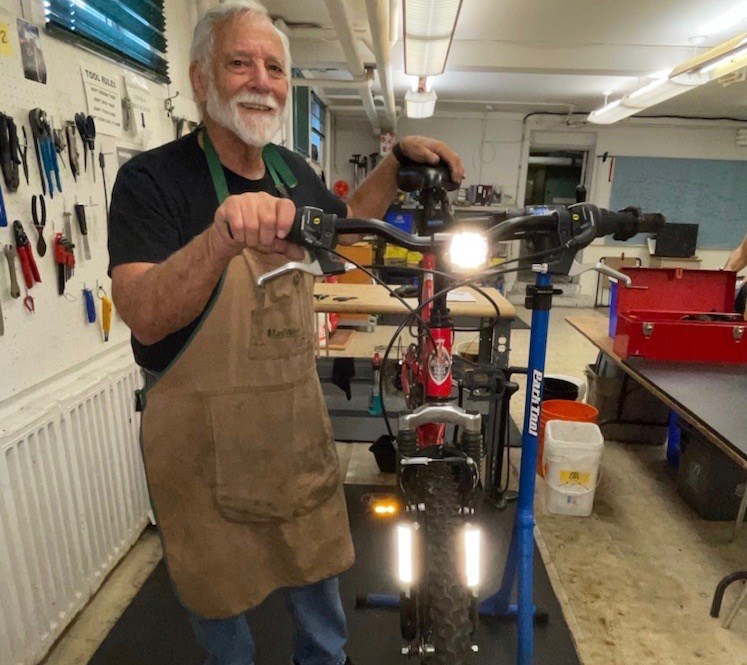
As many of the offshore workers in Niagara-on-the-Lake move on to apple farms, or head home, the volunteers who have been refurbishing and repairing bikes for them are shifting gears themselves, already looking ahead to next year.
Bikes for Farmworkers, with its workshop in the basement of the former Virgil School, is winding down operations for this season and looking ahead to a winter of working on bikes for when the hardworking men and women return next year.
Mark Gaudet, who with his friend Terry Weiner began refurbishing bikes for farmworkers in their garages, with their own money, started Bikes for Farmworkers In 2016. That year the men rebuilt a modest 40 bikes, which were either donated to farmworkers through a raffle at a local health fair, or sold at a small cost. Weiner, retired from a career as an aerospace engineering consultant and with some experience restoring old cars, knew how to fix a bike. Gaudet, who had worked in management for a paper company, had to learn from his friend. Their second year, they repaired many more bikes donated from a generous community, with the help of a handful of volunteers who came on board— 270 were refurbished, and another 168 repaired. Gradually donations from the community helped to make their organization self-sustaining.
A grant from the Niagara Community Foundation allowed them to set up workstations in the Virgil School basement in 2017, and buy the tools they needed.
They charge $20 for refurbished bikes, and although they pay for parts, some are also donated by the biking community.
But without a doubt, says Gaudet, the second summer of the COVID-19 pandemic has hampered their operations and ability to deliver bikes and services to farmworkers — donations from the community were down this past year.
People are holding on to their bikes, or if they want to get rid of them, are selling them online, he says.
The group was still able to refurbish and sell 291 bikes and repair 200 bikes, but by October 2019, pre-pandemic, the group of volunteers had already refurbished 549 bikes and repaired about 380 bikes brought to them by farmworkers. At that time they were looking for more bodies to help, but because of COVID and the need for volunteers to be spread out in their workshop, they have cut back their team to eight men who work on bikes Tuesdays and Thursdays, in two shifts of four, says Gaudet.
As men arrived looking for bikes this season, there was no more milling around in the workshop — they come in one at a time, and both the volunteers and farmworkers are accustomed to physically distancing and wearing masks.
“At 66, I’m one of the youngest,” says Gaudet. “We have a couple of volunteers in their 80s, so we’re not fooling around. And we’ve all been vaccinated. If anyone is donating a bike, we ask them to wait on the top of the stairs, and we’ll come to get the bike.”
Any bike they sell has a dated sticker on it, says Gaudet, and they often get bikes they refurbished in 2018 and 2019 back in the shop to be tuned up. Volunteers ensure all repaired bikes meet their operating standards.
“We go through a 50-point inspection process before a bike leaves the shop,” he says, “and I’m always the last one to look at it.”
Any bikes that are not structurally safe are scrapped and used for parts.
Refurbishing bikes donated by the community is still first and foremost what they do, says Gaudet, and donations of adult bikes continue to trickle in — they accept them year round. Although many are from NOTL, they also get bikes from other parts of Niagara, and also from the GTA. People who come to the Shaw Festival, or in town staying at B&Bs, sometimes heard about the work they do and will drop off bikes on their next trip, says Gaudet. Sometimes those who come to cycle will leave their bikes behind.
At this time of year, volunteers are looking for rideable, adult bikes to refurbish for next February or March, when farmworkers begin to arrive back in town.
Then, after a brief time off over the holidays, at the beginning of January the Winter Bike Repair Program begins.
Although some workers will crate and ship their bikes home to the Caribbean for their kids — Gaudet estimates about 20 per cent— those from Mexico would have to take them on the plane when they fly home, and not many do that. Most bikes are left behind for next year.
In November, when the workers have gone, Gaudet will begin hitting the larger farms, where he has developed good relationships with the farmers, and will pick up the bikes left behind. In January, Gaudet, Weiner, Ken Eden and other volunteers, will get them tuned up and take them back to the farms to be stored indoors, where the workers will be happy to find them in good shape when they return. Last year they reported about 125 bikes left behind, says Gaudet. Others that were dangerous were scrapped.
“We are looking forward to expanding this program, as it eliminates one more thing the workers have to worry when they return to their employer.”
COVID is also presenting challenges with supply chains, and getting parts and components for bicycles can be difficult, with long delays and increased prices for new parts, so for now, says Gaudet, they’re focusing on mountain and hybrid bikes, for which parts are more readily available.
Any NOTL farm operation interested in having their workers’ bicycles assessed and repaired is asked to contact Mark Gaudet at 289-783-1684, or Terry Weiner at 905-321-8638 for more details.